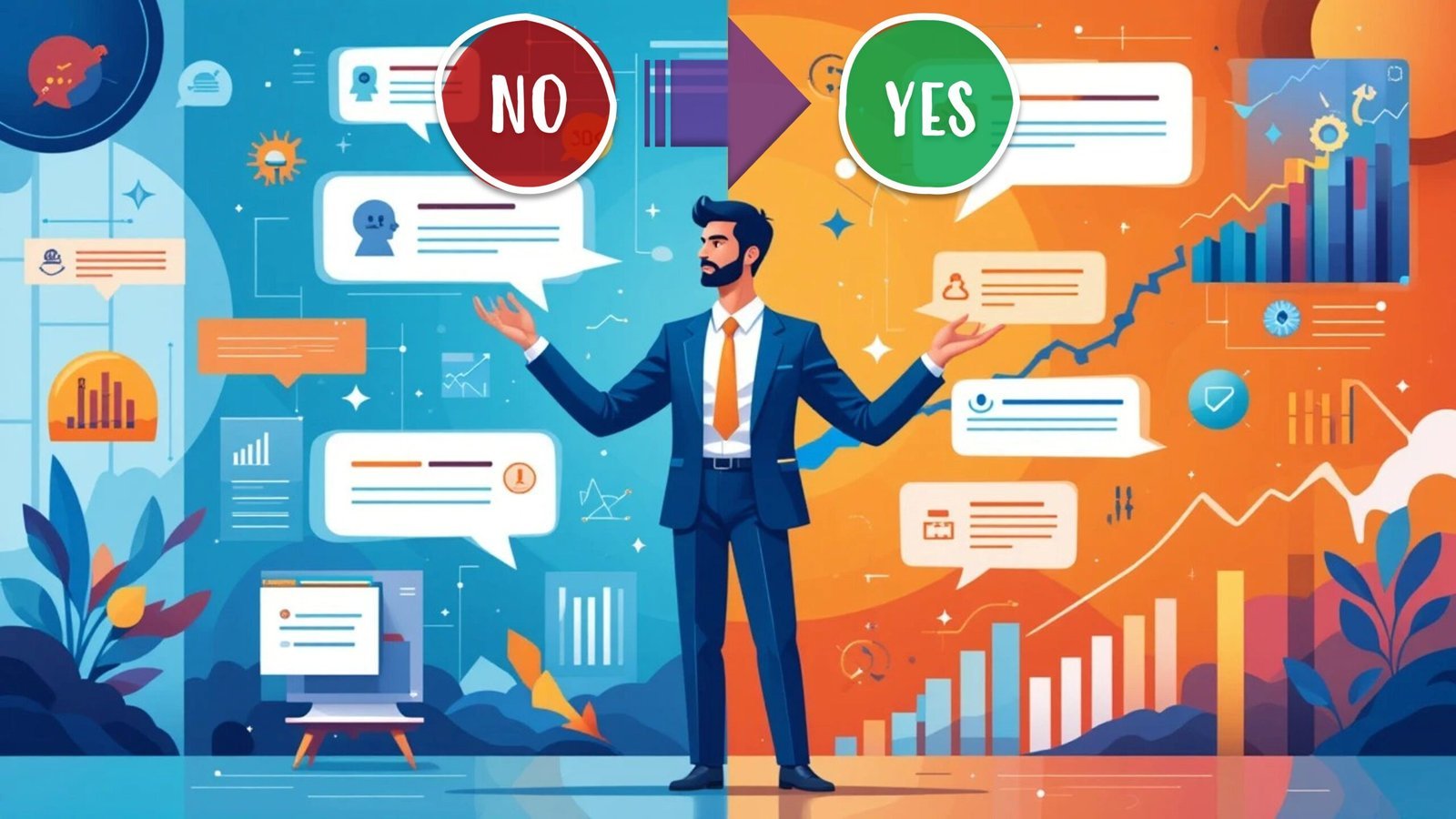Now Reading: Objection Mastery: Turn ‘No’s’ into Sales Wins
-
01
Objection Mastery: Turn ‘No’s’ into Sales Wins

Objection Mastery: Turn ‘No’s’ into Sales Wins
I. Introduction: Reframe “No” as an Opportunity in Sales
For any salesperson, the sound of “no” can feel like a door slamming shut. Rejection stings, and in sales, it can feel like a constant companion. Many salespeople fear sales objections, viewing them as roadblocks, signs of failure, and deal-breakers. But what if “no” wasn’t the end of the conversation? What if, instead of rejection, you saw objections as opportunities to achieve sales wins? Objection mastery let’s you convert NOs into Yes.
Top sales professionals understand a crucial secret: objections are not rejections, but rather engagement signals. A prospect who raises a sales objection is not necessarily saying “no” to your product or service; they are saying “not yet,” or “I need more information,” or “convince me.” They are engaged enough to voice their concerns, which is far more valuable than silence or disinterest.
Objection Mastery is the art of transforming these perceived roadblocks into stepping stones. It’s about equipping yourself with the objection handling skills and mindset to confidently navigate objections, address concerns, and ultimately, convert ‘no’s’ into sales wins. This article will delve into the strategies and techniques to help you reframe your perspective on objections and master the art of objection handling.
II. Understanding Sales Objections: Decoding the “No”
Before you can achieve objection mastery, you must first understand why sales objections occur. Sales objections are a natural and inevitable part of the sales process. They are rarely personal rejections, and often stem from logical and understandable reasons. Common causes include:
- Natural Skepticism: Prospects are naturally cautious and want to avoid making mistakes. Sales objections are a way to test your claims and ensure they are making a sound decision.
- Unmet Needs or Misunderstanding of Value: The prospect may not fully grasp how your product or service solves their specific problems or delivers sufficient value for their investment. They raise need objections.
- Hidden Concerns: Sometimes, the stated sales objection is not the real issue. Prospects may have underlying concerns about budget, authority, or timing that they are hesitant to reveal directly.
- Competitive Alternatives: Prospects are likely evaluating multiple options, and sales objections may reflect comparisons to competitors or existing solutions.
- Lack of Trust or Rapport: If you haven’t built sufficient trust, prospects may raise trust objections as a defense mechanism, hesitant to commit to someone they don’t fully trust.
Understanding these underlying reasons helps you approach objection handling with empathy and a problem-solving mindset. It’s also crucial to recognize the common categories of sales objections. These often fall into familiar buckets such as:
- Price/Budget Objections: “It’s too expensive,” “It’s not in our budget.”
- Need Objections: “I’m not sure we need this right now,” “We’re already satisfied with our current solution.”
- Trust/Credibility Objections: “I’m not familiar with your company,” “How do I know this will work for us?”
- Timing Objections: “We’re not ready to make a decision yet,” “Let’s revisit this next quarter.”
- Competition Objections: “We’re considering a competitor,” “Your competitor offers similar features at a lower price.”
- Authority Objections: “I need to discuss this with my team/manager,” “I’m not the final decision-maker.”
By anticipating these common objection types, you can prepare effective responses and strategies in advance for successful objection handling. However, remember that understanding the real objection is key to converting ‘no’s’ to ‘yes’. Often, the initial sales objection is just the tip of the iceberg. Your goal is to dig deeper and uncover the true underlying concern to achieve sales wins.
III. Mastering Objection Handling: The LAER Framework & Key Techniques
Effective objection handling is not about aggressive rebuttals or high-pressure tactics. It’s about a structured, empathetic approach that addresses concerns and builds confidence to achieve sales wins. A useful framework to guide your objection handling is the LAER model, which emphasizes a step-by-step approach to managing objections effectively [1].
- Listen: Truly listen to the prospect’s sales objection without interrupting. Focus intently on understanding their words, tone, and underlying emotions. Apply the 70/30 rule: let the prospect talk 70% of the time and you talk 30%. This demonstrates respect and ensures you fully grasp their concern during objection handling.
- Acknowledge: Acknowledge the prospect’s sales objection to validate their feelings and build rapport. Use phrases like:
“I understand your concern,” “That’s a valid point,” or “I can see why you might feel that way.”
This shows empathy and makes the prospect feel heard during objection handling.
- Explore: Don’t assume you know the root cause of the sales objection. Probe deeper with open-ended questions to uncover the real issue and improve your objection handling. Ask questions like:
“Could you tell me more about what’s making you say that?”, “What are your specific concerns about…?”, or “What would need to be different for this to be a good fit?”.
This helps you understand the sales objection beyond the surface level and refine your objection mastery.
- Respond: Once you understand the true sales objection, respond directly and effectively to convert ‘no’s’ to ‘yes’. Tailor your response to the specific concern, focusing on the value proposition and benefits that address the sales objection. Use evidence like case studies, testimonials, or data to support your claims and build credibility when handling sales rejection. Offer customized solutions where possible to directly address their unique needs and secure sales wins.
Within this LAER framework for objection mastery, several key techniques are essential for effective objection handling:
- Active Listening & Empathy: As mentioned, active listening is paramount for successful objection handling. Pay full attention, maintain eye contact (in virtual or in-person settings), and show genuine interest. Practice empathy by trying to see the situation from the prospect’s perspective to improve your objection mastery. This builds trust and opens the door for constructive dialogue, helping you convert ‘no’s’ to ‘yes’.
- Asking Probing Questions: Master the art of asking open-ended questions for effective objection handling. Avoid yes/no questions. Instead, use “what,” “how,” “why,” and “tell me more” to encourage the prospect to elaborate on their concerns and improve your objection mastery. This is crucial for uncovering hidden sales objections and understanding the true needs to achieve sales wins. Experts recommend using questions to control the conversation and guide the prospect toward a solution [2].
- Validating Concerns: Never dismiss or belittle a sales objection during objection handling. Even if you disagree with the premise, validate the prospect’s right to have that concern. Phrases like:
“I appreciate you bringing that up” or “That’s a really important question”
can diffuse tension and create a collaborative atmosphere, making objection mastery easier.
- Addressing with Value Proposition & Benefits: Your response during objection handling should always tie back to the value your product or service delivers and the specific benefits relevant to the prospect’s situation. Reiterate how you solve their problems and help them achieve their goals to convert ‘no’s’ to ‘yes’. Shift the focus from features to tangible outcomes to demonstrate objection mastery.
- Providing Social Proof: Overcome skepticism by providing social proof as part of your objection handling. Share relevant case studies, testimonials from satisfied clients, or data that demonstrates your product’s effectiveness and your company’s credibility to secure sales wins. This builds confidence and reduces perceived risk, improving your objection mastery. Testimonials, in particular, can be highly effective in building trust [3].
- Offering Custom Solutions: Where possible, demonstrate flexibility and offer tailored solutions to address specific sales objections. This shows you are listening to their unique needs and are willing to work with them to find a mutually beneficial arrangement, showcasing objection mastery. Customization can overcome need objections or concerns related to fit or specific requirements and help convert ‘no’s’ to ‘yes’.
IV. Turning Objections into Wins: Practical Strategies & Examples
Let’s look at practical strategies for handling sales rejections and common objection types, and examples of effective responses to achieve sales wins:
1. Price Objections (“It’s too expensive”):
- Strategy for Objection Mastery: Shift the conversation from price to value to convert ‘no’s’ to ‘yes’. Justify the investment by highlighting long-term ROI, cost savings, increased efficiency, or superior quality. Break down the cost into smaller units (e.g., cost per day) for effective objection handling.
- Example Response for Objection Handling:
“I understand that budget is a key consideration. However, many of our clients initially had similar concerns regarding price objections, but they found that by investing in our cloud-based accounting software, they actually saw a 15% reduction in accounting errors within the first six months. If you look at it in terms of daily cost, it’s actually less than the cost of a cup of coffee for each employee. Would you be open to exploring how we can tailor a plan to maximize your ROI and potentially see similar savings and sales wins?”
2. Need Objections (“I’m not sure we need this”):
- Strategy for Objection Mastery: Re-emphasize the problem your product/service solves and uncover unmet needs to convert ‘no’s’ to ‘yes’. Ask questions to understand their current situation and pain points. Connect your offering to their strategic goals for effective objection handling.
- Example Response for Objection Handling:
“I understand you might feel that way if your current spreadsheet system seems to be working, leading to need objections. But help me understand, what are your biggest challenges right now in managing customer data? Many of our clients initially didn’t realize the extent of the inefficiencies they were facing with manual data entry until they saw the improvements our CRM provides in automating lead tracking and reducing manual work by 40%. Could we explore briefly how these challenges might be impacting your lead conversion rates and if there’s potential for improvement and sales wins?”
3. Competition Objections (“We’re considering a competitor”):
Strategy for Objection Mastery: Acknowledge the competition respectfully, but highlight your unique differentiators and strengths to convert ‘no’s’ to ‘yes’. Focus on areas where you excel and provide specific examples for effective objection handling. Avoid directly badmouthing competitors to maintain objection mastery.
Example Response for Objection Handling:
“That’s great to hear you’re exploring your options thoroughly. Salesforce is a reputable company. What aspects of their offering are most appealing to you, leading you to consider competition objections? Knowing that helps me highlight what makes us uniquely suited to address your needs and achieve sales wins. For example, unlike Salesforce, we specialize in integrating seamlessly with your existing marketing automation platform which has helped clients like ‘Acme Corp’ achieve a 25% increase in marketing campaign effectiveness. Perhaps we could compare specifically how our integration capabilities addresses your key requirements and helps you achieve objection mastery?”
4. Timing Objections (“Not ready yet”):
- Strategy for Objection Mastery: Understand the real reason behind the timing objection to convert ‘no’s’ to ‘yes’. Is it budget cycles, internal approvals, or genuine lack of urgency? Offer to stay in touch, provide valuable resources, and gently create a sense of urgency if appropriate for effective objection handling.
- Example Response for Objection Handling:
“I understand that timing is important, leading to timing objections. Is there a specific timeline you’re working with for implementing a new HR system? Knowing that will help me tailor our follow-up for better objection handling. In the meantime, would it be helpful if I shared a case study showing how companies who implemented our HR solution saw rapid results and achieved faster employee onboarding and reduced administrative time by 30% quickly? Even if you’re not ready to move forward immediately, having this information might be valuable for your planning process and future objection mastery.”
Key principles for turning objections into wins and achieving objection mastery:
- Stay Positive and Confident: Your attitude is contagious for effective objection handling. Approach sales objections with a positive and confident demeanor to convert ‘no’s’ to ‘yes’. Believe in your product and your ability to help the prospect achieve sales wins. Positive attitude is consistently linked to sales success [4].
- Be Patient and Persistent: Objection handling is a process, not a one-time event. Be patient, persistent, and willing to engage in dialogue to improve your objection mastery. Sometimes, it takes multiple interactions to overcome sales objections and secure sales wins.
- Focus on Building Relationships: Objection handling is an opportunity to build stronger relationships by demonstrating empathy, understanding, and a genuine desire to help the prospect succeed and achieve objection mastery.
- Always Seek to Understand: Your primary goal is to understand the sales objection fully before attempting to respond for effective objection handling. Understanding leads to more effective and tailored solutions to convert ‘no’s’ to ‘yes’.
Strong relationships are the foundation of long-term sales success.
Gartner [5]
V. Proactive Objection Handling: Anticipation & Preparation for Sales Wins
The best way to handle sales objections is to minimize them in the first place and improve your objection mastery. Proactive objection handling involves anticipating common sales objections and addressing them preemptively throughout the sales process to increase sales wins.
How to be proactive in objection handling and achieve objection mastery:
- Research Your Audience: Thoroughly research your target prospects and industries to understand their common challenges, pain points, and likely sales objections.
- Develop an Objection Library: Compile a list of common sales objections you encounter. Develop well-crafted, concise, and value-driven responses for each to enhance your objection mastery. Practice these responses until they become natural for effective objection handling.
- Refine Your Sales Pitch: Incorporate objection handling into your sales narrative. Address potential sales objections proactively during your presentation or conversation to convert ‘no’s’ to ‘yes’. For example, if price is often a concern, proactively highlight the ROI early in your pitch to improve your objection mastery.
- Use FAQs and Content Marketing: Create FAQs or content (blog posts, articles, videos) that address common sales objections related to your product or service. Share these resources with prospects proactively as part of your objection handling strategy.
- Role-Play and Practice: Regularly role-play objection handling scenarios with colleagues or mentors to enhance your objection mastery. Practice your responses and refine your techniques in a safe environment to secure more sales wins.
By proactively addressing potential sales objections, you build trust, demonstrate thoroughness, and reduce the likelihood of encountering resistance later in the sales process, leading to more sales wins and improved objection mastery.
VI. Conclusion: Embrace Objections, Master the ‘No,’ and Drive Sales Success
In the competitive world of sales, objection mastery is a critical differentiator between average performers and top revenue generators. While many salespeople shy away from sales objections, viewing them as signs of failure and handling sales rejection poorly, true sales professionals recognize them for what they are: opportunities in disguise to convert ‘no’s’ to ‘yes’.
By reframing your mindset, embracing sales objections as engagement, and mastering effective objection handling techniques, you can transform “no’s” into “yeses” and significantly boost your sales success and achieve sales wins. Remember to listen actively, acknowledge concerns, explore the real issues, and respond with value and tailored solutions for optimal objection mastery.
Objection mastery is not just a skill; it’s a mindset shift. It’s about developing the confidence, empathy, and strategic thinking to navigate resistance, build stronger relationships, and ultimately, convert sales objections into sales wins. Embrace the “no,” master the art of objection handling, and unlock your full sales potential to achieve consistent sales wins.
References:
[1] – HubSpot – Sales Objections: How to Handle Objections in Sales and Turn them Into Opportunities – https://blog.hubspot.com/sales/sales-objection
[2] – Salesforce – Sales Objection Handling: Overcoming No – https://www.salesforce.com/solutions/sales-cloud/sales-objection-handling/
[3] – LinkedIn Sales Blog – The Power of Customer Testimonials – https://business.linkedin.com/sales-solutions/blog/sales-skills/2019/power-of-customer-testimonials
[4] – Forbes – Sales Success Is 90% Attitude And 10% Aptitude – https://www.forbes.com/sites/larryalton/2017/07/05/sales-success-is-90-attitude-and-10-per-cent-aptitude/%3Fsh%3D6aa2dd8d7219
[5] – Gartner – General knowledge about relationship building in sales















